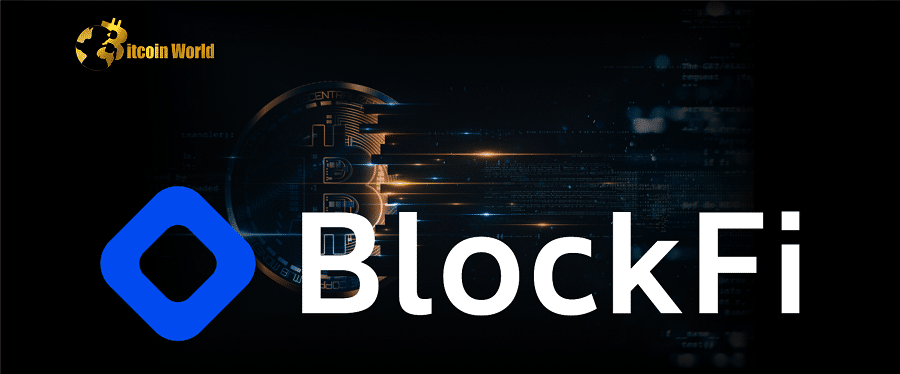The crypto winter continues to send shivers down the spines of investors and industry players alike. The latest headline grabbing development? Bankrupt crypto lending firm BlockFi is reportedly selling off a staggering $160 million in loans backed by Bitcoin mining machines. Yes, you read that right. Let’s dive into what this means and why it matters.
BlockFi’s Bitcoin Mining Machine Loan Sell-Off: Decoding the Details
According to sources cited by Bloomberg, BlockFi, which filed for Chapter 11 bankruptcy in November 2022, is looking to offload debts secured by approximately 68,000 Bitcoin mining machines. The deadline for potential buyers to submit their bids is January 24th. This move is part of BlockFi’s ongoing efforts to navigate its bankruptcy proceedings and recoup assets for its creditors.
Here’s a breakdown of what we know:
- Massive Debt Portfolio: BlockFi is selling loans worth $160 million.
- Collateral: These loans are secured by a substantial 68,000 Bitcoin mining machines.
- Bankruptcy Fallout: This sale is a direct consequence of BlockFi’s Chapter 11 bankruptcy, triggered by significant exposure to the collapsed crypto exchange FTX.
- Distressed Assets: Some of these loans are already reportedly in default and potentially undercollateralized due to the declining value of Bitcoin mining equipment in the current market.
- Bidding Deadline: Interested parties had until January 24th to submit their offers.
Why is BlockFi Selling These Loans?
The core reason is simple: BlockFi needs to raise capital to repay its creditors. With over 100,000 creditors to answer to, as per their bankruptcy filing, BlockFi is under immense pressure to liquidate assets and generate funds. Selling these Bitcoin-machine-backed loans is a significant step in that direction.
As crypto lawyer Harrison Dell, director at Cadena Legal, explained to Cointelegraph, if the value of the Bitcoin mining equipment used as collateral has fallen below the loan amounts, these loans become less valuable to BlockFi. Essentially, they need to cut their losses and recover what they can.
Who’s Likely to Buy These Distressed Crypto Debts?
Dell suggests that the bidders are most likely debt collection companies. These firms specialize in purchasing distressed debt at discounted rates – often for “cents on the dollar.” They are betting on their ability to recover more value from these loans than they paid for them, even if it means navigating complex recovery processes.
Think of it like this:
| Scenario | Implication for BlockFi | Implication for Debt Buyers |
|---|---|---|
| Loans sold at a significant discount | BlockFi recovers some capital, reduces debt burden | Buyers potentially profit if they can recover more than the purchase price from borrowers or collateral |
| Low demand for loans, poor sale price | Limited capital recovery for BlockFi, potentially impacting creditor payouts | Less competitive bidding environment, potential for higher returns if assets are undervalued |
Is This Just the Tip of the Crypto Bankruptcy Iceberg?
According to Harrison Dell, this asset sale could be just the beginning. He stated, “This is just the start of the asset sales from BlockFi and other crypto firms in Chapter 11 bankruptcy in the US.”
This statement raises a crucial point: BlockFi’s situation is not unique. The broader crypto market downturn has exposed vulnerabilities across the industry, leading to bankruptcies and financial distress for several firms. We can likely expect to see more asset sales and restructuring efforts as these companies attempt to navigate the challenging economic climate.
BlockFi’s Balancing Act: Retaining Staff Amidst Chaos
Adding another layer to BlockFi’s complex situation, the company has also petitioned the court to release funds for bonuses to retain key staff during the Chapter 11 proceedings. Megan Crowell, BlockFi’s chief people officer, emphasized the critical need for financial incentives to prevent a talent exodus. Losing experienced staff during bankruptcy could severely hinder the company’s restructuring efforts and long-term prospects.
This highlights a common challenge in bankruptcy situations: how to maintain operational stability and expertise while undergoing significant financial turmoil. It’s a delicate balancing act between cost-cutting and ensuring the survival and potential future of the organization.
What Does This Mean for the Crypto Industry?
BlockFi’s Bitcoin mining loan sale, and its broader bankruptcy saga, serve as a stark reminder of the risks inherent in the crypto market. Here are some key takeaways:
- Market Volatility: The crypto market’s extreme volatility can rapidly erode asset values and trigger cascading financial problems, as seen with FTX and BlockFi.
- Lending Risks: Crypto lending, while promising high yields, carries significant risks, particularly when loans are undercollateralized or collateral value plummets.
- Bankruptcy Implications: Bankruptcy proceedings in the crypto space are complex and can lead to asset fire sales, impacting asset values and investor confidence.
- Industry Consolidation?: The current downturn may lead to consolidation within the crypto industry, with stronger players acquiring assets from distressed firms.
Final Thoughts: Navigating the Crypto Winter
BlockFi’s attempt to sell its Bitcoin mining machine-backed loans is a significant event in the ongoing crypto winter narrative. It underscores the financial pressures faced by crypto firms and the ripple effects of major collapses like FTX. While debt sales and asset liquidations are necessary steps for BlockFi to address its financial woes, they also signal continued turbulence in the crypto market. As the industry navigates this challenging period, vigilance, risk management, and a focus on sustainable practices will be more critical than ever.
Disclaimer: The information provided is not trading advice, Bitcoinworld.co.in holds no liability for any investments made based on the information provided on this page. We strongly recommend independent research and/or consultation with a qualified professional before making any investment decisions.


